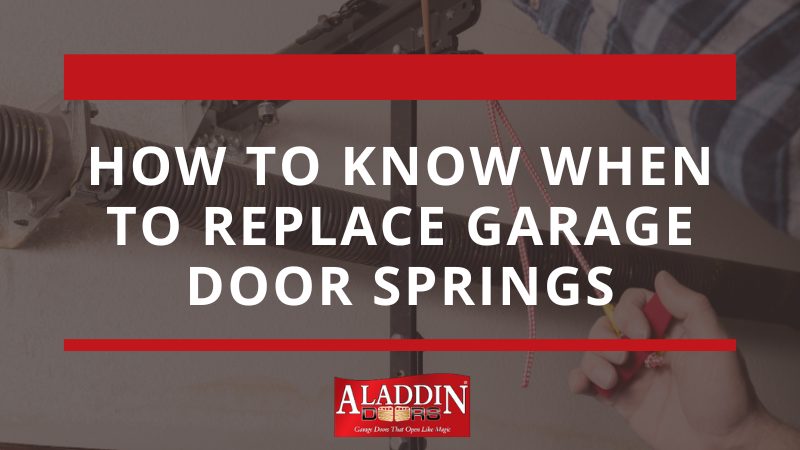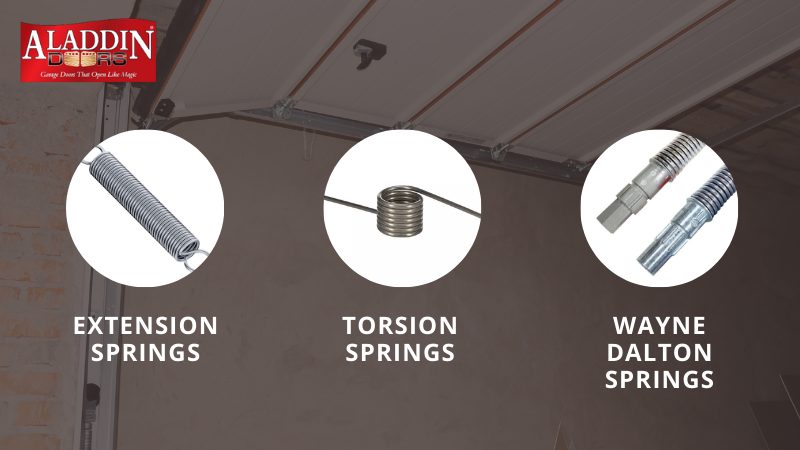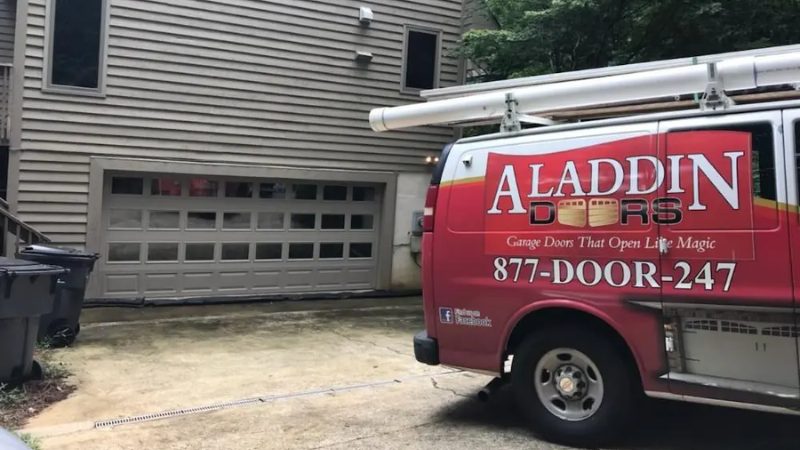
How to Know When to Replace Garage Door Springs
Garage doors are surprisingly heavy, weighing between 80 and 200 pounds for single-car doors and 200 to 400 pounds for two-car doors. The garage door springs play a major role in lifting and lowering the door efficiently, as they are designed to balance the door’s weight by storing energy when the door is lowered and releasing it to lift the door with ease. On average, garage door springs last 7 to 10 years, though with proper care and maintenance, some can last up to 12 years, ensuring reliable performance.
Garage door springs are under significant tension, and if they become worn or damaged, they can cause the door to become unbalanced, creating a potential safety hazard. Recognizing the signs of aging or failing springs is crucial to addressing the issue early. Replacing them before they fail can prevent more serious problems and keep your garage door functioning safely and reliably.
In this guide, we discuss the different types of garage door springs and what they do, as well as the main signs that your garage door springs need to be replaced. If it is time to replace your garage door springs, make sure you call Aladdin Doors for professional garage door spring replacement.
How Much Does Spring Replacement Cost?
The cost of replacing garage door springs ranges from an average of $120 to $250 for extension springs and $170 to $450 for torsion springs. The cost can also be affected by the following factors:
- Type of door: The cost of replacement will be higher for garage doors that require torsion springs than those that require extension springs.
- Number of doors: Replacing the springs for a two-door garage costs more than a single-door garage, but professionals often offer discounts for multiple doors.
- Materials: Better quality garage door springs have a higher up-front cost, but they last longer, which saves money on maintenance.
- Upgrading springs: Upgrading from extension to torsion springs costs more than simply replacing the extension springs.
- Labor: The cost of labor for garage door spring replacement varies between professionals.
Should You Hire Professionals?
The following are the benefits of hiring a professional like Aladdin Doors to handle the garage door spring replacement:
- Save time and money: Our professionals can quickly replace your garage door springs, which saves time and money.
- Reduce injury risk: We have the proper tools to safely replace the garage door springs, which reduces the risk of injury.
- Proper tools: We use the right tools and equipment to handle the replacement effectively and reduce the risk of breaks and other issues.
- Warranty: Our new garage door springs come with a warranty for your peace of mind.
What are Garage Door Springs?
Garage door springs are essential components of a garage door system that help lift and lower the door smoothly and safely. They counterbalance the door’s weight, making it easier to open manually or with an automatic opener. There are two main types of garage door springs: torsion springs, which are mounted above the door and twist to provide lifting force (including enclosed systems like the Wayne Dalton TorqueMaster), and extension springs, which are located on either side of the door and stretch to create tension.

Extension Springs
Extension springs are garage door springs that store energy by extending to lift or lower the door. They are typically between 2 and 4 feet in length and are mounted on either side of the garage door track. Depending on the amount of force, extension springs may jerk or move at erratic speeds. If an extension spring breaks, it will snap off and can hit something or someone at such a strong force that it can cause significant damage and serious injury, or even death. This is why it is important to replace extension springs before they become damaged and to have a professional manage the installation.
The following are the three main types of extension springs:
- Open-looped extension springs: Open-looped extension springs are a type of garage door extension spring that features a simple, open hook or loop at the end. This open loop connects the spring to the door and supporting hardware without the need for special tools or complicated attachments.
- Double-looped extension springs: Double-looped extension springs are garage door springs that feature two connected loops at the end instead of just one. These double loops create a stronger and more durable connection point between the spring and the door hardware, offering greater resistance to wear and breakage compared to open-looped springs.
- Clipped-end extension springs: Clipped-end extension springs are a type of garage door spring designed with small metal clips at the ends instead of loops. These clips create a stronger and more secure attachment to the door’s hardware, helping to better distribute the stress when the door is in motion. Clipped-end springs are the most durable style of extension springs, making them ideal for heavier garage doors and high-cycle applications where longevity and reliability are especially important.
Torsion Springs
Torsion springs are springs that are mounted on a torsion pole above the opening, in the center of the garage door. Traditional torsion springs are larger in size and made with thicker wire, which means they do not need as many turns to generate the necessary tension. These springs work like extension springs, as they both use gravity to store and release tension to open and close the door. The main difference is that torsion springs twist instead of extending when the door is opening and closing.
Torsion springs are stronger and more durable than extension springs and allow for more controlled motion, which results in less wear on the garage door opener. Depending on the size of the door, it may require between one and four torsion springs.
Wayne Dalton TorqueMaster Springs
Wayne Dalton TorqueMaster springs are a type of torsion spring system designed to be safer and more compact compared to traditional torsion or extension springs. The springs in a Wayne Dalton TorqueMaster system are much smaller in diameter and wire size compared to traditional torsion springs. Rather than being exposed like traditional torsion or extension springs, these springs are hidden in a metal tube and mounted above the garage door. As the garage door opens and closes, the springs twist within the tube to help counterbalance the weight of the door.
Because of their compact size, TorqueMaster springs need to be wound more times to generate enough force to counterbalance the weight of the garage door. Older TorqueMaster springs use an electric drill, while newer models are tensioned using a socket and socket wrench. This hidden spring design not only protects owners from potential spring-related injuries but also gives the system a more streamlined and finished look. The setup may contain one or two internal springs to ensure smooth, reliable performance, depending on the specifications of the door.
How Long Do Garage Door Springs Last?
Garage door springs typically last between 7 to 12 years under normal use, which is about 10,000 to 15,000 cycles (one cycle = one full open and close). However, their lifespan can vary depending on factors like the quality of the springs, how often the door is used, the weight of the door, and whether regular maintenance is performed. Heavy usage (multiple openings and closings per day) can significantly shorten the lifespan of the springs, sometimes requiring replacement in as little as 5 to 7 years.
Why Do Garage Door Springs Break?
Garage door springs can break for several reasons, from general wear and tear to improper maintenance and other issues with the garage door system. The following are some of the main causes of damage to garage springs:
- Wear and tear: Garage door springs typically last for around 10,000 cycles and over that time, they will gradually become worn out from repeated use. The more wear and tear the springs experience, the more likely they are to eventually become damaged.
- Rust: Garage door springs are vulnerable to rusting, which can eventually cause them to corrode, greatly increasing the risk of damage. You can clean small amounts of rust from the springs and lubricate them several times each year to prevent rusting and extend their lifespan.
- Improper maintenance: Regularly maintaining your garage door springs can help slow down wear and tear and extend their life. Make sure to lubricate them regularly and check the balance of the door each season. You should inspect your garage door springs more often during the winter months, as cold weather can cause the garage door springs to break more easily.
- Door jams: The garage door can jam if enough dirt and debris accumulate within the door track and block the roller. Door jams can damage the springs because they cannot store or release energy when the door becomes stuck. This can cause the springs to lose their ability to store energy which may require repair or replacement.
4 Signs Your Garage Door Springs Need to be Replaced
The best way to prevent broken garage door springs and the issues they cause is to have the springs replaced before they break. The following are signs that you should replace your garage door springs:
- Difficulty opening and closing: Worn or damaged garage door springs can cause difficulty when opening and closing the door. Springs are responsible for counterbalancing the weight of the garage door, making it easy to lift manually or with a door opener. If the springs are broken, stretched out, or losing tension, the door may become very heavy, jerky, uneven, or fail to open or close properly. In some cases, a broken spring can even make the door unsafe to operate.
- Uneven movement: If one spring is weaker or broken, it won’t support its side of the door properly, leading to tilting, shaking, or jerky motion as the door opens or closes. This uneven strain can also cause additional wear on other parts of the garage door system, like the cables and tracks, and may eventually lead to a complete malfunction if not addressed.
- Loud noises: It is normal for garage door springs to squeak on occasion, but excessive squeaking may indicate that the springs are damaged or worn out. Apply lubricant to squeaky garage door springs, and if the noise persists, the springs need to be replaced.
- Visible damage: Make sure to check for any visible damage to the garage door springs, including gaps in the coils, rust and corrosion, stretched or elongated coils, fraying cables near the springs, and warping or bending. Damaged garage door springs should be replaced before they break.
Why Should I Replace My Garage Door Springs?
If there is a problem with your garage door springs, the door will not open and close properly and may even be dangerous to operate. Faulty garage door springs should be replaced immediately to restore the functionality and safety of your garage. A professional like Aladdin Doors can help determine if your garage door springs can be repaired or should be replaced.
The following are the main reasons to replace your garage door springs:
- Safety: Any issue with your garage door springs creates an immediate safety hazard. Problems with the springs can cause the garage door to suddenly slam shut, which can damage the door, and extension springs can fly off and cause damage to your garage or vehicle. If these springs hit a person, they can cause serious injury or even death.
- Longer lifespan: Proper maintenance of your garage door springs helps them reach their expected lifespan, which is an average of 10,000 to 15,000 cycles, or about 7-10 years. If your garage door is the main way you enter and exit your home, you should consider replacing the springs with high-cycle torsion springs that have a longer lifespan and bring a better return on investment (ROI).
- Lower maintenance costs: It is possible to repair broken garage door springs, but there is no telling how long the spring will last after being repaired. If one spring breaks, it also increases the risk of damage to the other spring. Replacing both springs when there is a problem is the most cost-effective option, as you will not have to worry about additional problems and the cost of maintenance and repairs.
Garage door springs hold a lot of tension, which makes them very dangerous to handle without the proper tools and expertise. When it is time to replace your garage door springs, it is best to hire a professional to handle the job.
Expert Garage Door Spring Replacement

If your garage door springs are nearing the end of their expected lifespan or are exhibiting any of the issues discussed above, it may be time to have them replaced to prevent them from breaking and causing additional problems. Our professionals at Aladdin Doors provide expert garage door spring replacement services to effectively replace your springs with standard or high-cycle springs.
You can call us at or submit a form to schedule an appointment or get same-day service for garage door spring replacement for your home or business.

